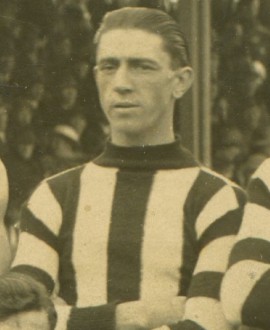

There aren’t many club officials who have taken to the field while in the middle of their administrative careers – but Bill Buck was one of that rare breed.
Buck had the unusual distinction of playing several games for Collingwood in 1924, just months after he’d taken over as club secretary from the legendary Ern Copeland. Unfortunately the experience didn’t go well for either aspect of his career.
Buck first came to Victoria Park in 1920, having played his junior footy at Melbourne High School (where he was the youngest member of the First 18). He then played in the Reporter District Competition with Canterbury Juniors (1916-17), and Broadway (1918) as a centre, before being noticed by Collingwood scouts whilst playing for Camberwell Methodists in the Protestant Churches Association in 1919. He also turned out for Burwood in 1920 while on Collingwood’s list.
He had been one of the lucky ones in the First World War, having enlisted in October of 1918 – just three weeks before the War ended. So he was not called up for active duty.
Buck was tried in the centre during his first practice matches with the Pies, but was named at half-back for his senior debut against Geelong in Round 2. He quickly settled into the new role, being named among the best players in that first game, and it became the position he would play in almost all his 32 League appearances. Injuries limited his output to just two games in his first season, but by 1921 Buck had become a regular, often attracting praise from the critics for his approach to life in defence. “Buck never made a mistake,” wrote the Australasian in 1921, “his marking, kicking, and judgment being excellent.”
The Herald went to even greater lengths to extol his virtues the following year:
“Measured by the standard of other noted back line players, W. Buck, the Collingwood defender, is neither tall nor weighty. But he is a stalwart, every Inch of him, and the sheer consistency of his play assures for him the place in the team which he has held since 1920 … they have found Bill Buck equally as steady and as hard to break. Always on the left wing of the half-back line, he is one of the dependable type, who never falters before the most pressing onslaughts.
“For his height and build Buck is an exceptionally clean mark. This result is got by accurate timing rather than ability to overreach an opponent. He is an inch short of 6 feet, and strips considerably less than 12 stone. Yet he has that inborn tuition of the typical Collingwood footballer, for doing the right thing nicely, and never wasting a second more than is necessary in clearing the ball from the danger zone.
“He has a clear conception of a back man's job, and he carries it out to the letter. Every Magpie player seems to do the same; hence that superb machine-like system that has been the envy of all other clubs. The job, as Buck sees it, is to play for the ball always. Once in possession no risks must be taken by attempting spectacular play—just a sharp dash of five yards, without bouncing the ball, and then a straight pass to the centre wing man, who is always on the alert and running out to meet it.”
Buck had injured his knee in that debut game against Geelong in 1920, and it gave him trouble for the rest of his career. After 12 games in 1921, he managed only 10 in 1922 and a dismal five in 1923, prompting his first retirement.
By that stage he had already been elected as a players' representative on the CFC Committee, and had been nominated by Copeland as his successor in the role of secretary. Buck’s father, William Snr, had started an accountancy firm in 1895 and the younger Buck was already showing signs of following in his father’s footsteps. It seemed a natural fit, and he was elected as Collingwood secretary at the AGM in March of 1924.
In 1924 Buck served as the only former player on the VFL Permit & Match Committee and League delegate from Collingwood. But he never truly got used to the idea of being a ‘former’ player. He continued to train and, when injuries struck in the middle of the year, was called back to the field for two games. He played another in the last match of the season. But the book Kill For Collingwood said his on-field focus affected the quality of his work as secretary.
On 23 January 1925 he was a passenger on a commercial bus travelling from Melbourne to Sorrento, which collided with a parked truck. As a result of the collision, he broke his arm in three places causing permanent curvature, forcing him to end both his stint as secretary and his playing career (he successfully sued the driver/proprieter of the bus for £450). When new secretary George Connor took over, it was said that he found the club’s records in a chaotic condition.
Still, that didn’t stop Bill Buck from striking out on a wonderful career with his father’s firm, William Buck, which he assumed command of in 1927. The company’s profile says that young Bill was known as a man of ever-ready wit and a great entertainer who approached business life with clear thinking, good advice and logic. He guided the company into the 1970s, providing it with the foundations that would later see it become both a national and international accounting giant.
Today, Bill Buck is best remembered for the crucial role he played in growing and developing one of the financial world’s biggest names. But he also played 32 games for Collingwood, and holds the highly unusual distinction of having played three of them while in office. There aren’t too many others in VFL/AFL history who can claim that!
- Peter Marshall and Michael Roberts
CFC Career Stats
| Season played | Games | Goals | Finals | Win % |
|---|---|---|---|---|
| 1920-1924 | 32 | 1 | 1 | 59.4% |
CFC Season by Season Stats
| Season | GP | GL | B | K | H | T | D | Guernsey No. | ||
|---|---|---|---|---|---|---|---|---|---|---|
Awards







